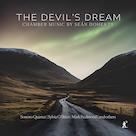

Seán Doherty: The Devil's Dream
Métier
The life of composer Seán Doherty (b. 1987) has developed along two equally critical paths, on one side formal studies that culminated in a PhD in musicology at Trinity College Dublin and his current position as an assistant professor of music at Dublin City University, on the other the sensibility that crystallized through exposure to the Irish fiddle tradition of his Derry hometown. As Doherty himself acknowledges in introductory notes to this terrific collection of chamber music, he is, “at heart, a fiddle player” whose native tongue is Irish traditional music. Having learned from teachers in both traditional and classical music, it's only natural for him to express himself through their combination.
Beyond being marked by Doherty's compositional signature, the works on this 2023 Dublin-recorded set are distinguished by their folk tale foundations. Each of the five pieces is rooted in storytelling, two of them meditations on death and the others grounded in defining events in Irish history: the Easter Rising, the Troubles, and the Great Famine. His deep engagement with his country and its history is evident in the programmatic content, while the compositional gifts he's refined through his formal studies comes through in the works' arresting structural designs and melodic content. Appearing throughout the release is Sonoro Quartet (violinists Sarah Jégou-Sageman and Jeroen De Beer, violist Séamus Hickey, cellist Léo Guiguen), whose passionate readings of these premiere recordings are augmented by contributions from soprano Sylvia O'Brien and uilleann piper Mark Redmond, with a handful of others bringing further enrichment to this exceptional recording.
No piece better represents Doherty's approach than The Devil's Dream, written in 2015 in memory of his teacher, the fiddle player James Byrne, who died during his walk home from a seisiún (the Irish word for “session”) in 2008. Performed by string quartet, the work is loosely based on two tunes Byrne taught the composer, “An Londubh” and "The Devil's Dream,” the former a slow air and the latter a reel. Structurally, fragments of the tunes collide and merge during its fourteen minutes, their flow an attempt by Doherty to evoke Byrne's mental activity during that final walk. The keening air begins the piece, with the pitches of its melodies sliding until its plaintive, fully recognizable form coalesces. At that point, the reel intrudes to do battle with the air, the slow sliding of the latter bludgeoned by the savagery of the reel. Combat ensues between the tunes, each hellbent on overpowering the other and the activity furiously heating up, until a quotation of the plainchant “Dies irae” ushers in the banishment of the reel and a final rising of the air in a transfigured form. Sonoro Quartet elevates this remarkable work with a performance of searing intensity.
As uncompromising and occasionally vicious is Lament for the Poets (2016), which couples O'Brien and Sonoro Quartet and includes a striking spoken word contribution from James Bingham in its central movement. Presented as three different responses to the Easter Rising, the material casts Ireland as a beautiful young woman seen by the sleeping poet as a vision and who's seeking help for the country to be freed. Doherty draws for inspiration from texts by Lola Ridge, Marianne Moore, and Francis Ledwidge for this substantial three-part work. O'Brien gives powerful voice to Ridge's fierce spirit in the harrowing “The Tidings” (her lament being that she isn't in Dublin to mount the barricades: “They are fighting to-night in Sackville Street, And I am not there!”). A tad less intense is "Sojourn in the Whale,” in which Moore laments the unbearable injustices and indignities Ireland has suffered; O'Brien again delivers an indelible vocal performance, even if Bingham's dramatic, multi-tracked reading proves, if anything, even more arresting. In the concluding part “Lament for the Poets,” Ledwidge casts the spéirbhean (“skywoman”) as a poor old woman mourning the loss of her ‘blackbirds,' which represent the Nationalist rebels, and Doherty musically draws on the Irish slow air “The Lament for Staker Wallace” for a commanding close that sees O'Brien accenting the volcanic string playing with Meredith Monk-like gestures.
The remainder of the album's dedicated to instrumental works, the first No Go (2016) pairing Redmond and Sonoro Quartet on a rousing setting grounded in part on the rhythm of a traditional Irish dance tune. Doherty characterizes the volcanic piece as his “imagining of a new Fox Chase, in which a human is being hunted,” and the excitement, wail, and tension of the music certainly conveys unrelenting pursuit. The album's closing pair are shorter, but they're no less memorable than those preceding them. Composed for the National Famine Commemoration 2018 at University College Cork, the two-part Drochshaol (literally translating as“the bad life”) is based on letters from the Famine years (1845-49) and supplements Redmond and the string quartet with harpist Lauren O'Neill, flutist Robert Harvey, and Molly Tobin on concertina. Its first part, “Fr. McCarthy's Lament,” is wrenching in its emotional outpouring and poignant too, its second, “Prof. Boole's Farewell,” initially sunnier in the way it works a dance tune into its fabric.
Testifying to his self-proclaimed identity as a fiddle player, Doherty himself joins in on Paddy's Rambles through the Gravel Walks (2023), which draws from two Irish fiddle tunes, “Paddy's Rambles Through the Park” and “The Gravel Walks to Granie.” Echoing the opening work, this short closing one weaves together a slow air and a reel (though in less macabre manner), and prominently features O'Neill's harp alongside uilleann pipes, flute, concertina, and strings. Admittedly, Doherty's music is not always easy listening, but it is never less than compelling and imaginative, and his highly personalized coupling of history and contemporary compositional practice is genuinely original. The evidence at hand shows him to be one of Ireland's most exciting contemporary composers.April 2025